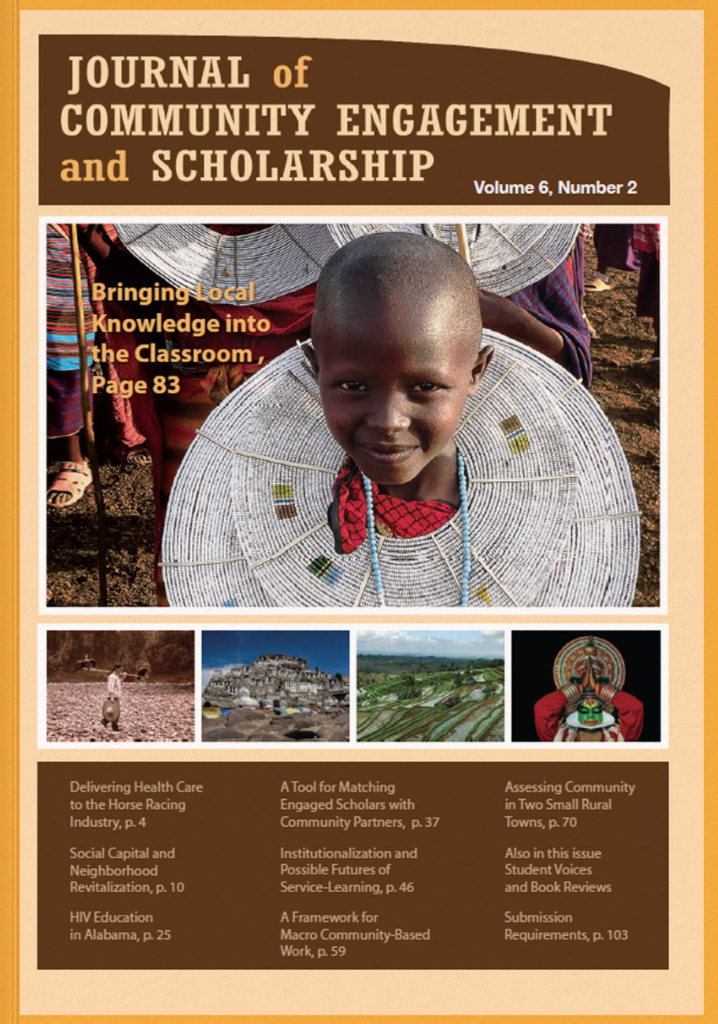A page summarising all the journals that currently publish papers about community engagement
If you know of other journals not on this list that publish on the topic of engagement with health research, please get in touch
Journal of Community Systems for Health
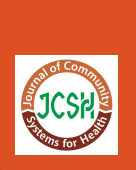 Subject Area: An open-access, peer-reviewed publication that considers articles related to community systems that create health in general, and community health systems in particular.
Subject Area: An open-access, peer-reviewed publication that considers articles related to community systems that create health in general, and community health systems in particular.
Publishes: Research articles, reviews, short reports on topical issues.
Submission and deadlines: All articles are posted online immediately as they are ready for publication and will be assigned a DOI number for citation and other purposes once published without delay
Editors: Charles Michelo (Professor): Nkwazi Research University, Zambia
Contact details: Via online system - https://journals.ub.umu.se/index.php/jcsh/index
Relevant example: An evaluation of community acceptability and adoption of the community-based TB care program using the diffusion of innovation model
Social Science and Medicine
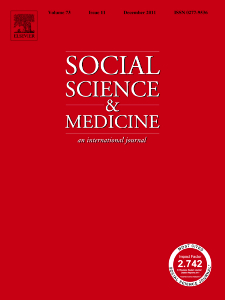 Subject Area: International and interdisciplinary publication about social science research on health.
Subject Area: International and interdisciplinary publication about social science research on health.
Publishes: Research articles, reviews of up to 8,000 words, short reports on topical issues of up to 4,000 words and commentaries.
Submission and deadlines: Published biweekly with online submission.
Editors: Ichiro Kawachi, MD, PhD, S.V. Subramanian, PhD.
Contact details: Via online system - https://www.journals.elsevier.com/social-science-and-medicine/editorial-board/sv-subramanian-phd
Relevant example: Marsh, V., Kamuya, D., Rowa, Y., Gikonyo, C. and Molyneux, S. (2008). Beginning community engagement at a busy biomedical research programme: Experiences from the KEMRI CGMRC-Wellcome Trust Research Programme, Kilifi, Kenya. Social Science & Medicine, 67(5),721-733.
This paper outlines a community engagement strategy in Kilifi, Kenya and aims to summarise the rationale for community engagement in research as well as the issues in early implementation phases.
PLOS ONE
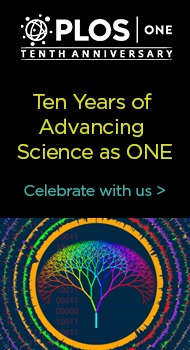 Subject area: All areas of science (medical research, engineering, natural sciences and the related social sciences).
Subject area: All areas of science (medical research, engineering, natural sciences and the related social sciences).
Publishes: PLOS ONE will publish all disciplines within science and medicine but only primary research, i.e. will not publish reviews or opinion pieces.
Submission and deadlines: Rolling deadlines with online submission.
Editor: Joerg Heber.
Contact details: jheber@plos.org
Relevant example: Alhassan, R., Nketiah-Amponsah, E., Spieker, N., Arhinful, D., Ogink, A., van Ostenberg, P. and Rinke de Wit, T. (2015). Effect of Community Engagement Interventions on Patient Safety and Risk Reduction Efforts in Primary Health Facilities: Evidence from Ghana. PLOS ONE, 10(11): e0142389.
This paper outlines the impacts of community engagement use (training community groups to assess healthcare quality) to improve patient care in Ghana’s over-stretched healthcare system.
Research for all
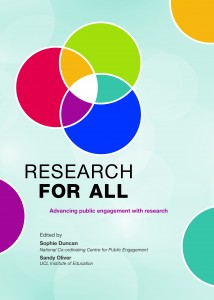 Subject area: A new journal focusing on public engagement.
Subject area: A new journal focusing on public engagement.
Publishes: There is an emphasis on articles which describe, analyse or explain engaged research and investigate the relationship between theory and practice. Especially keen for collaborative contributions. They are a new journal and have not yet published an article specifically about LMICs, but this doesn't mean that they won't.
Submission and deadlines: Electronic submission of manuscripts via email to the managing editor.
Editor: Pat Gordon-Smith.
Contact details: p.gordon-smith@ucl.ac.uk.
Science Communication
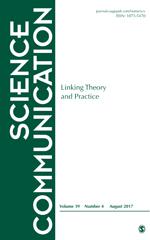 Subject area: Science communication.
Subject area: Science communication.
Publishes: Papers in three areas: science communication within research communities, between scientists and the public and scientists and policy makers.
Submission and deadlines: Online submission via: http://mc.manuscriptcentral.com/sc
Editor: Susanna Hornig Priest.
Contact details: editorscicom@gmail.com
Public understanding of science
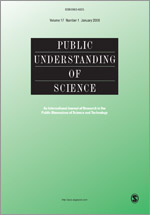 Subject area: Public understanding of science.
Subject area: Public understanding of science.
Publishes: A wide range of topics, all of which explore the relationships between science and the public e.g. public understanding/attitudes of science, science in schools, lobbying, science information services for the public, science in developing countries and they welcome contributions on public engagement.
Submission and deadlines: Online submission via http://mc.manuscriptcentral.com/pscience
Editor: Massimiano Bucchi.
Contact details: see website - https://uk.sagepub.com/en-gb/eur/author/massimiano-bucchi
Global health communication
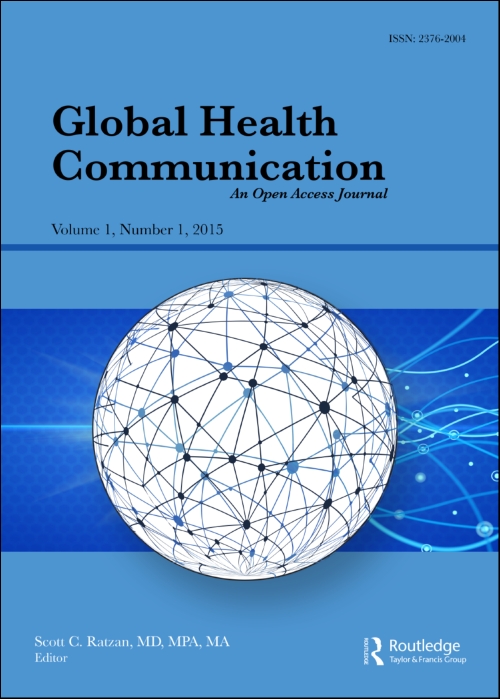 Subject area: Addresses public health issues affecting an international community.
Subject area: Addresses public health issues affecting an international community.
Publishes: Many topics including community engagement, to influence scholarship around public health communication, policy and behavioural change.
Submission and deadlines: Online submission via: https://mc.manuscriptcentral.com/uhcm - clearly indicate that the paper is for Global Health Communication.
Editor: Editor-In-Chief: Scott Ratzan, MD, MPA.
Contact details: globalhealthcomm.editor@gmail.com.
Relevant example: McArthur-Lloyd, A., McKenzie, A., Findley, S., Green, C. and Adamu, F. (2016). Community Engagement, Routine Immunization, and the Polio Legacy in Northern Nigeria. Global Health Communication, 2(1), pp.1-10.
This paper explains its use of community engagement to improve access to health services in Nigeria, especially for those who have increased barriers (e.g. women for are required to seek permission before using facilities, and those affected by poverty). Their community engagement approach aimed to challenge social norms, by holding community discussion groups, engaging political and religious leaders and using targeted activities to engage the most vulnerable (e.g. young women).
Tropical Medicine & International Health
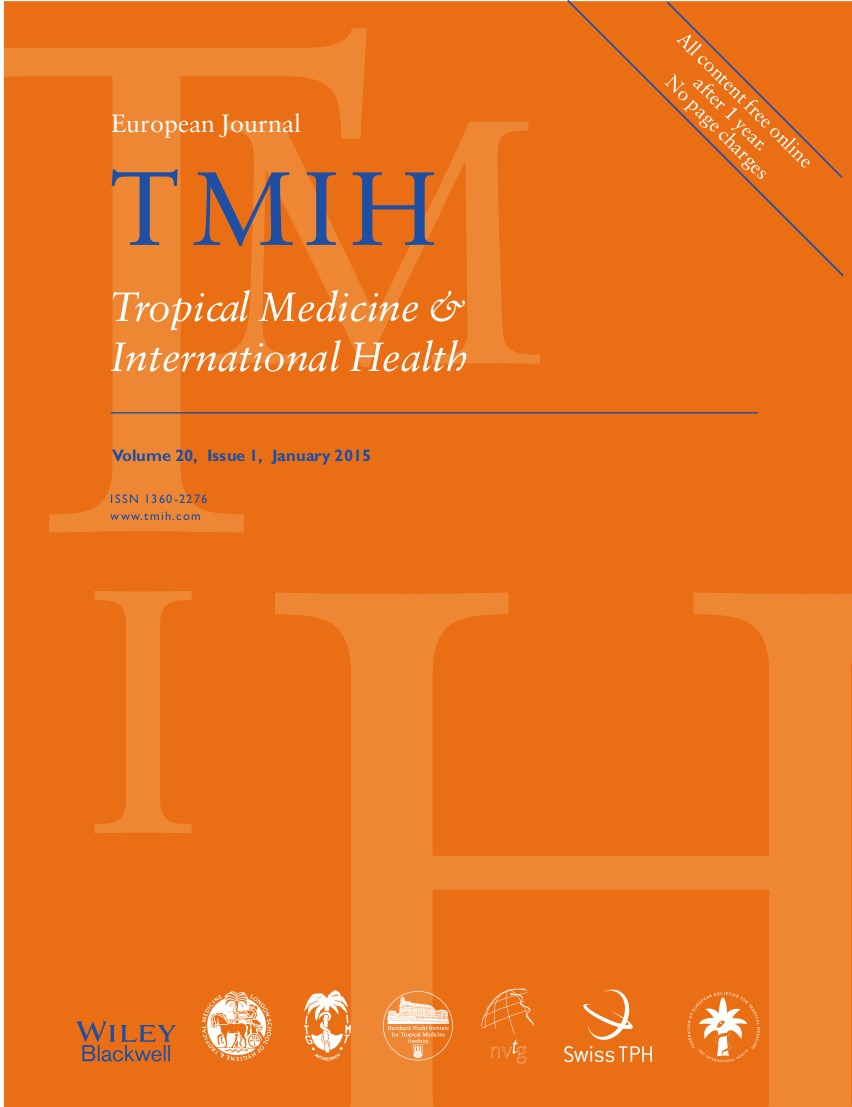 Subject area: This journal publishes topics based around malaria, HIV, tuberculosis, neglected infectious diseases, water and sanitation, non-communicable diseases and public health.
Subject area: This journal publishes topics based around malaria, HIV, tuberculosis, neglected infectious diseases, water and sanitation, non-communicable diseases and public health.
Publishes: Papers relating to any of the above topics, but at least one of the listed authors must be from the country where the research is taking place.
Submission and deadlines: Online submission via: http://www.editorialmanager.com/tmih/default.aspx
Editors: H. van Asten, H. Fletcher, T. Junghanss, T. Marchant, C.G. Meyer and P. Van der Stuyft
Contact details: for each editor available via: http://onlinelibrary.wiley.com/journal/10.1111/(ISSN)1365-3156/homepage/editors.htm
Global bioethics
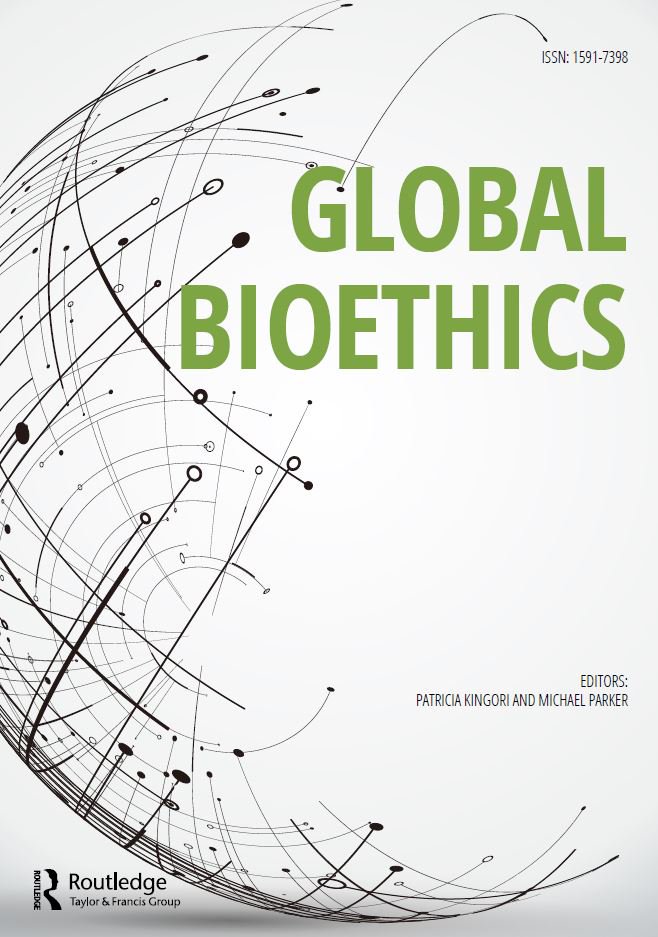 Subject area: Ethical aspects of global health research.
Subject area: Ethical aspects of global health research.
Publishes: Papers relating to ethics in a variety of socio-economic and cultural contexts in order to promote critical analysis of bioethics. Global bioethics also publishes field notes – shorter obersavtions/initial findings to reflect live/day-to-day issues in ethics.
Submission and deadlines: Rolling deadline with online submission via - http://www.edmgr.com/rgbe/default.aspx
Editors: Patricia Kingori and Michael Parker.
Contact details: patricia.kingori@ethox.ox.ac.uk, michael.parker@ethox.ox.ac.uk
Journal of Empirical Research on Human Research Ethics
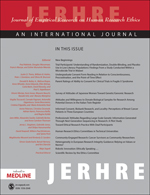 Subject area: Any ethical considerations, issues or taboos related to human research, specifically empirical research.
Subject area: Any ethical considerations, issues or taboos related to human research, specifically empirical research.
Publishes: Publishes research papers or reviews of empirical research which aims to improve ethical problem solving.
Editor: Editor in chief: Douglas Wassenaar.
Contact details: see website - https://uk.sagepub.com/en-gb/eur/author/douglas-wassenaar
Relevant example: Molyneux, S. and Bull, S. (2013). Consent and Community Engagement in Diverse Research Contexts: Reviewing and Developing Research and Practice. Journal of Empirical Research on Human Research Ethics, 8(4), pp.1-18.
This paper describes the outcomes of a community engagement and consent workshop in Kilifi, Kenya. It outlines the importance of research to carried out in a respectful manner where value to the community in at the forefront.
Health promotion international
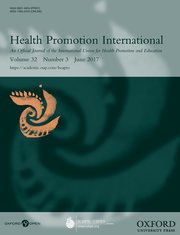 Subject area: Major themes and innovations in the health promotion field.
Subject area: Major themes and innovations in the health promotion field.
Publishes: Original research, reviews and debates. Contributions are also welcome to those outside the health field, e.g. education, employment, media and community networks. Papers could describe theories or concepts of health promotion, research involving health promotion, planned or spontaneous health promotion activities and social development.
Submission and deadlines: Online submission via - http://mc.manuscriptcentral.com/hpi.
Editor: Editor-in-chief: Evelyne de Leeuw.
Contact details: See website - https://academic.oup.com/heapro/pages/Editorial_Board.
Qualitative health research
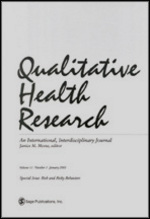 Subject Area: Interdisciplinary and international journal to enhance health care and develop the understanding of qualitative methods of health research.
Subject Area: Interdisciplinary and international journal to enhance health care and develop the understanding of qualitative methods of health research.
Publishes: A wide variety of topics, such as analysis of the illness experience, experience of caregivers, health and health-seeking behaviours, healthcare policy and sociocultural organisation of health care from a wider variety of perspectives.
Submission and deadlines: Published monthly. Online submission via: http://mc.manuscriptcentral.com/qhr.
Editor: Janice M. Morse
Contact details: Janice.Morse@nurs.utah.edu
Relevant example: Macdonald H, Abney K, Abrams A and Truyts C. (2016). Challenges in exploratory methods for tuberculosis research in South Africa. Qual Helath Res, 26(8) 1123-36
This paper describes a research project to understand why morbidity and mortality rates of TB in South Africa are among the highest in the world. Researchers engaged with TB-infected persons, their families, social networks to understand the life of an infected persons. However, they found that TB stigma was one of their main challenges in collecting this information.
Citizen Science: Theory and Practice
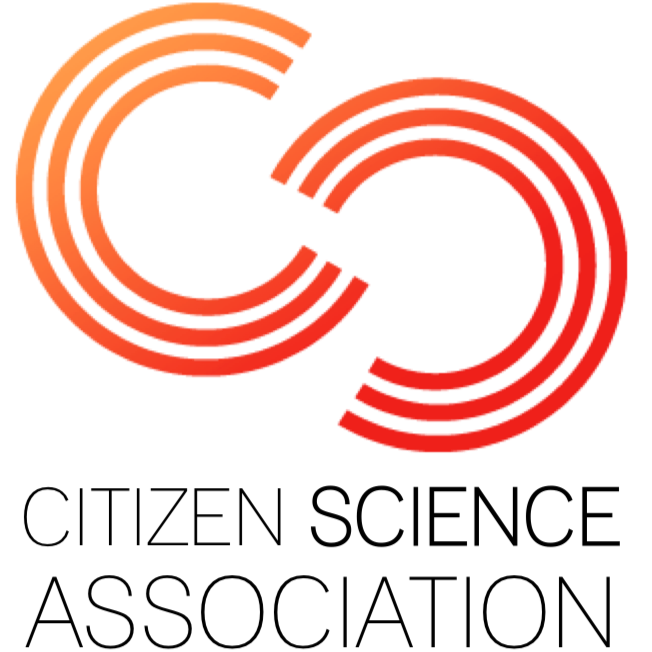
Subject area: Citizen Science
Publishes: This is a publication of the Citizen Science Association. It is a central space for scholarly exchanges across disciplines, aimed at helping advance the field of citizen science. This journal is not conceived as a venue for publishing discipline-specific scientific outcomes of citizen science projects.
Submission and deadlines: Online submissions via https://theoryandpractice.citizenscienceassociation.org/author/login/?submit=True. There are no specific deadlines. Articles are published online as a continuous volume throughout the year. If your paper is accepted for publication, you will be asked to pay an Article Publication Charge.
Open Access Policy: This journal provides immediate open access to its content. Authors of articles published remain the copyright holders and grant third parties the right to use, reproduce, and share the article according to the Creative Commons license agreement.
Editor: Editor-In-Chief: Rick Bonney
Contact details: rickbonney@cornell.edu
Relevant example: Embedded Assessment as an Essential Method for Understanding Public Engagement in Citizen Science.
Journal of Arts and Communities
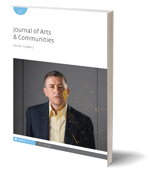 Subject Area: The Journal of Arts and Communities seeks to provide a critical examination of the practices known as community or participatory arts, encompassing a field of work defined for this purpose as incorporating active, creative collaboration between artists and people in a range of communities.
Subject Area: The Journal of Arts and Communities seeks to provide a critical examination of the practices known as community or participatory arts, encompassing a field of work defined for this purpose as incorporating active, creative collaboration between artists and people in a range of communities.
Publishes: The journal takes a cross-artform and interdisciplinary approach, including work happening in performance, visual arts and media, writing, multimedia and collaboration involving digital technology and associated forms. In part this will create an archive that will document work which can otherwise be ephemeral.
Submission and deadlines: Published monthly. Online submission via: http://mc.manuscriptcentral.com/qhr.
Open Access Policy: This publication is not open access although a couple of open access issues have been made available.
Editor: Stephanie Knight
Contact details: stephaniejaneknight@googlemail.com
Relevant example: The power to heal us with a smile and a song: Senior Well-being, Music-based Participatory Arts and the Value of Qualitative Evidence (Open Access Article)
The Journal of Community Engagement and Scholarship
Subject Area: This journal from Alabama University in the United States principally focusses on university and community partnerships with a specific interest in community-participatory process. The journal had extended its reach beyond North America to include international contributors and readers, and represent diverse disciplines—from social work to nursing, from urban design to civil engineering, and from natural resources to medicine.
Publishes: All forms of writing, analysis, creative approaches, and methodologies are accepted. The journal encourages new authors.
Submission and deadlines: Published twice a year, print and online. All submissions and inquiries should be sent to jces@ua.edu
Open Access Policy: This publication is not open access although a couple of open access issues have been made available.
Editor: Dr. Nick Sanyal
Contact details: jces@ua.edu
Relevant Example: Mini-Med School: Developing Partnerships with the Community and Between Health Professions and Students. Annette I. Peery and Kathryn M. Kolasa This article charts the experiences of those involved in a Mini-Med School conducted by one rural, university in Southern United States. The health fair within this model relied on the collaboration of multiple health professions.
Action Research
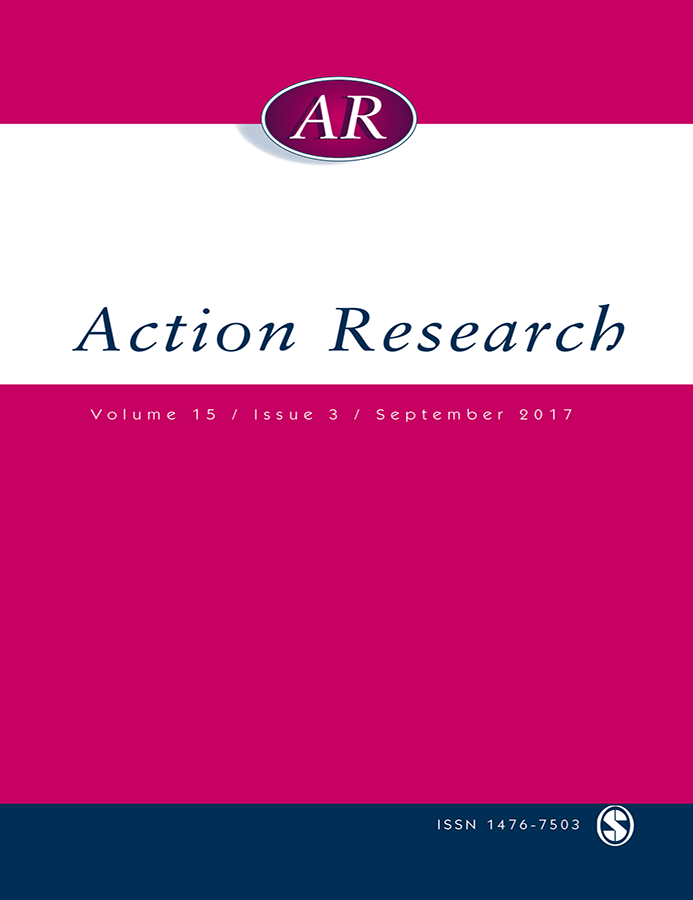
Subject area: A forum for the development of the theory and practice of action research.
Publishes: Articles on accounts of action research projects, explorations in the philosophy and methodology of action research, and considerations of the nature of quality in action research practice. Action Research is read by academics and professionals engaged within the fields and disciplines of: Healthcare, Education, International Development and the Arts (amongst others)
Submission and deadlines: Published Quarterly. Online Submissions Via https://mc.manuscriptcentral.com/arj and no fees payable to submit or publish.
Open Access Policy: Action Research offers optional open access publishing via the SAGE Choice programme.
Editor: Editor-in-chief: Hilary Bradbury, Editor Emeriti: Peter Reason
Contact details: hilary@hilarybradbury.net
Journal of Science Communication

Subject area: JCOM wants to challenge and dialogue with the world of social studies of science, stressing the importance of communicative processes in science's development and the dynamics of contemporary knowledge societies. The journal is committed to adopting a free circulation of information and encouraging a non-eurocentric perspective, encompassing visions from fields such as as gender studies, social history, action-research.
Publishes: Online and quarterly. In addition to research articles, each issue contains a thematic commentary composed by several essays from multidisciplinary and international authors.
Submission and deadlines: Online Submissions Via https://jcom.sissa.it/jcom/index.jsp. There is no article processing or submissions charge.
Open Access Policy: Open Access
Contact details: jcom-eo@jcom.sissa.it
Relevant Example: The Ethics of Science Communication What is it that really makes communicating science a good, moral thing to do? And are there limits to the potential ‘goodness’ of science communication? In this article, authors argue it is time we consider what an ethics of science communication might look like.
This work, unless stated otherwise, is licensed under a Creative Commons Attribution 4.0 International License

